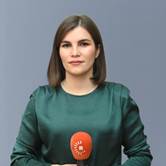ERBIL, Kurdistan - Archeologists working on exploring pre-historic remains inside the historic Erbil citadel on Wednesday deciphered an ancient inscription on a millennia-old tablet found in the excavations.
Hezha Zahir, Erbil citadel’s head of artifacts department told Rudaw that the archeologists working on the site have deciphered the cuneiform writings on a tablet found during the excavation as a message written to Ishtar, the ancient Mesopotamian goddess of love, war, and fertility.
“One of the written words read ‘great queen,’ referring to Ishtar, and it was believed that Ishtar’s temple was inside the Erbil citadel,” said Zahir, adding that other words were also deciphered, but the phrase “great queen” was the most obvious and they were able to verify it.
The Citadel’s artifacts department in cooperation with the French Institute of the Near East has started a 45-day project to conduct excavations in the citadel's heart for the first time ever. The last excavation process was conducted in the surrounding areas of the historic citadel in 2015. The project is expected to end on Thursday.
“Erbil was mentioned in lots of old texts of Mesopotamia, but now we discovered a tablet in Erbil citadel itself,” said George Muammaris, the director of the French Institute of Near East, noting that the tablets dated back to the second millennium BC.
In an interview with Rudaw’s Nwenar Fatih last week, Muammaris said that “nine French missions currently operate in the Kurdistan Region to explore archaeological remains from prehistoric times to the Islamic periods.”
Erbil Citadel was designated a World Heritage Site by UNESCO in 2014. The citadel is located in the downtown of Erbil and dates back to 4,000 years BC. Renovation efforts began around 2009 and they are still ongoing. The citadel overlooks Shar Square and the central bazaar, and is a popular destination for tourists and locals with a souvenir shop, textile, and geology museum.
Millions of tourists, mostly from Iraqi central and southern provinces, visit the Kurdistan Region annually, with the majority choosing Erbil province as their destination.
Hezha Zahir, Erbil citadel’s head of artifacts department told Rudaw that the archeologists working on the site have deciphered the cuneiform writings on a tablet found during the excavation as a message written to Ishtar, the ancient Mesopotamian goddess of love, war, and fertility.
“One of the written words read ‘great queen,’ referring to Ishtar, and it was believed that Ishtar’s temple was inside the Erbil citadel,” said Zahir, adding that other words were also deciphered, but the phrase “great queen” was the most obvious and they were able to verify it.
The Citadel’s artifacts department in cooperation with the French Institute of the Near East has started a 45-day project to conduct excavations in the citadel's heart for the first time ever. The last excavation process was conducted in the surrounding areas of the historic citadel in 2015. The project is expected to end on Thursday.
“Erbil was mentioned in lots of old texts of Mesopotamia, but now we discovered a tablet in Erbil citadel itself,” said George Muammaris, the director of the French Institute of Near East, noting that the tablets dated back to the second millennium BC.
In an interview with Rudaw’s Nwenar Fatih last week, Muammaris said that “nine French missions currently operate in the Kurdistan Region to explore archaeological remains from prehistoric times to the Islamic periods.”
Erbil Citadel was designated a World Heritage Site by UNESCO in 2014. The citadel is located in the downtown of Erbil and dates back to 4,000 years BC. Renovation efforts began around 2009 and they are still ongoing. The citadel overlooks Shar Square and the central bazaar, and is a popular destination for tourists and locals with a souvenir shop, textile, and geology museum.
Millions of tourists, mostly from Iraqi central and southern provinces, visit the Kurdistan Region annually, with the majority choosing Erbil province as their destination.









Comments
Rudaw moderates all comments submitted on our website. We welcome comments which are relevant to the article and encourage further discussion about the issues that matter to you. We also welcome constructive criticism about Rudaw.
To be approved for publication, however, your comments must meet our community guidelines.
We will not tolerate the following: profanity, threats, personal attacks, vulgarity, abuse (such as sexism, racism, homophobia or xenophobia), or commercial or personal promotion.
Comments that do not meet our guidelines will be rejected. Comments are not edited – they are either approved or rejected.
Post a comment